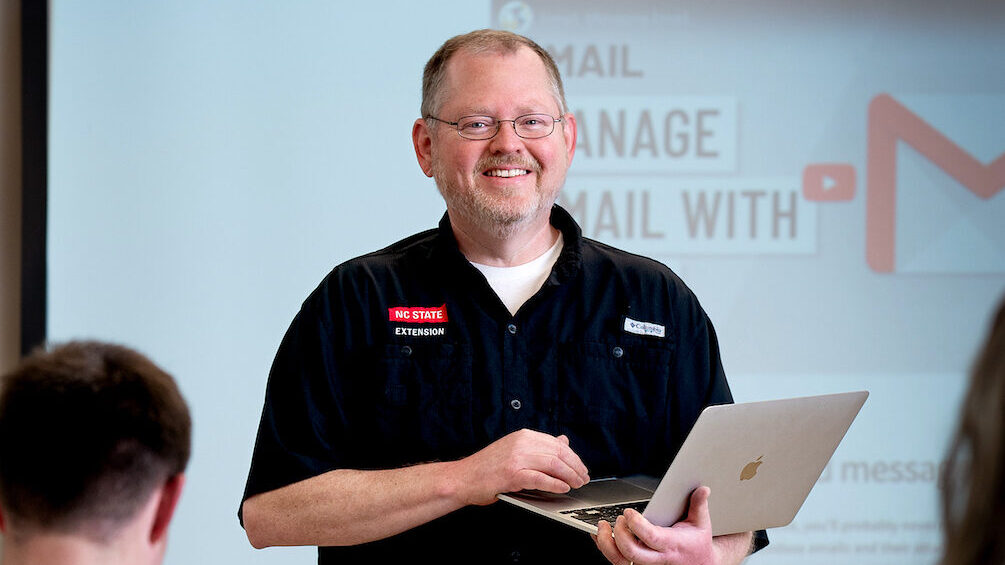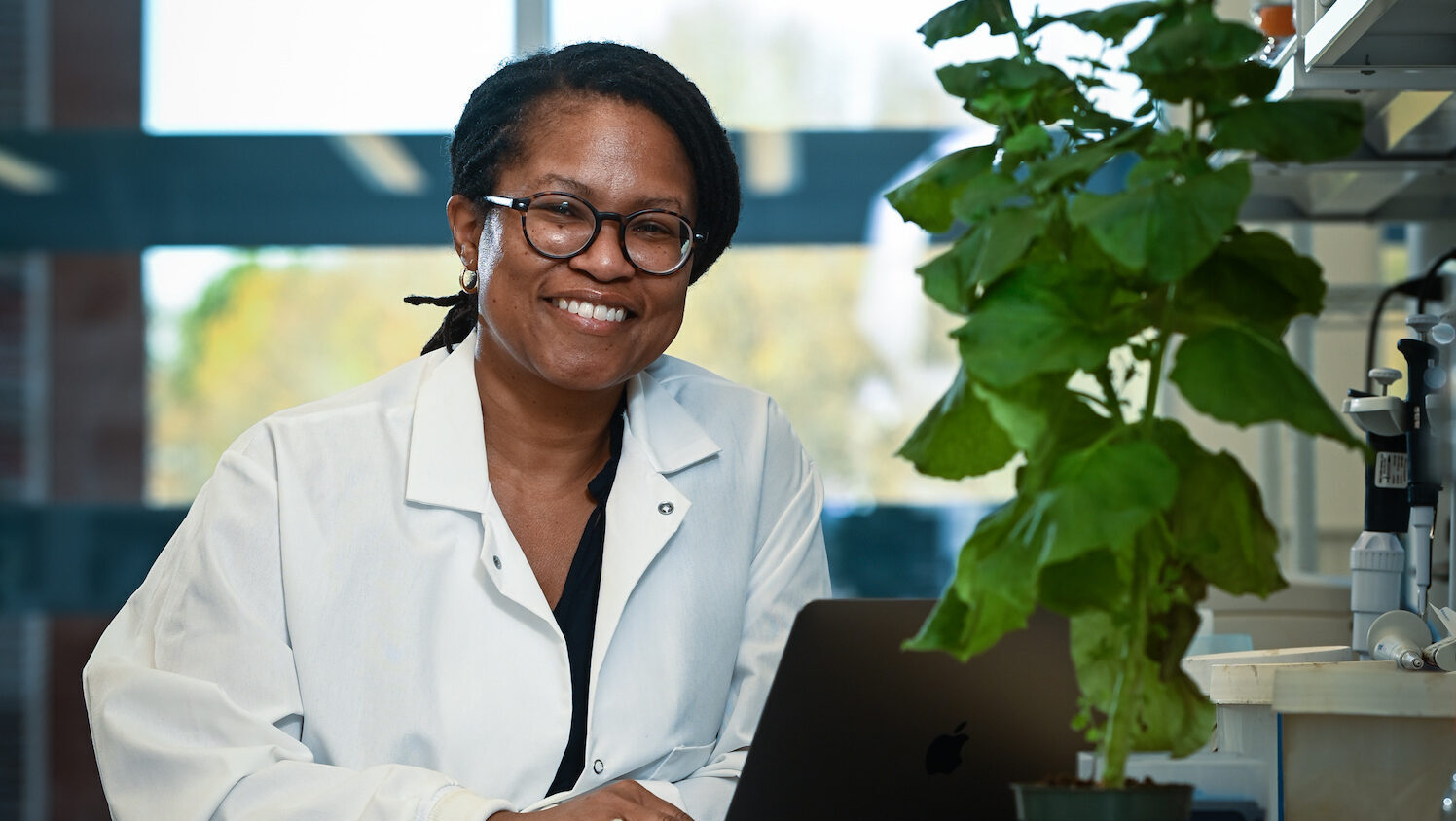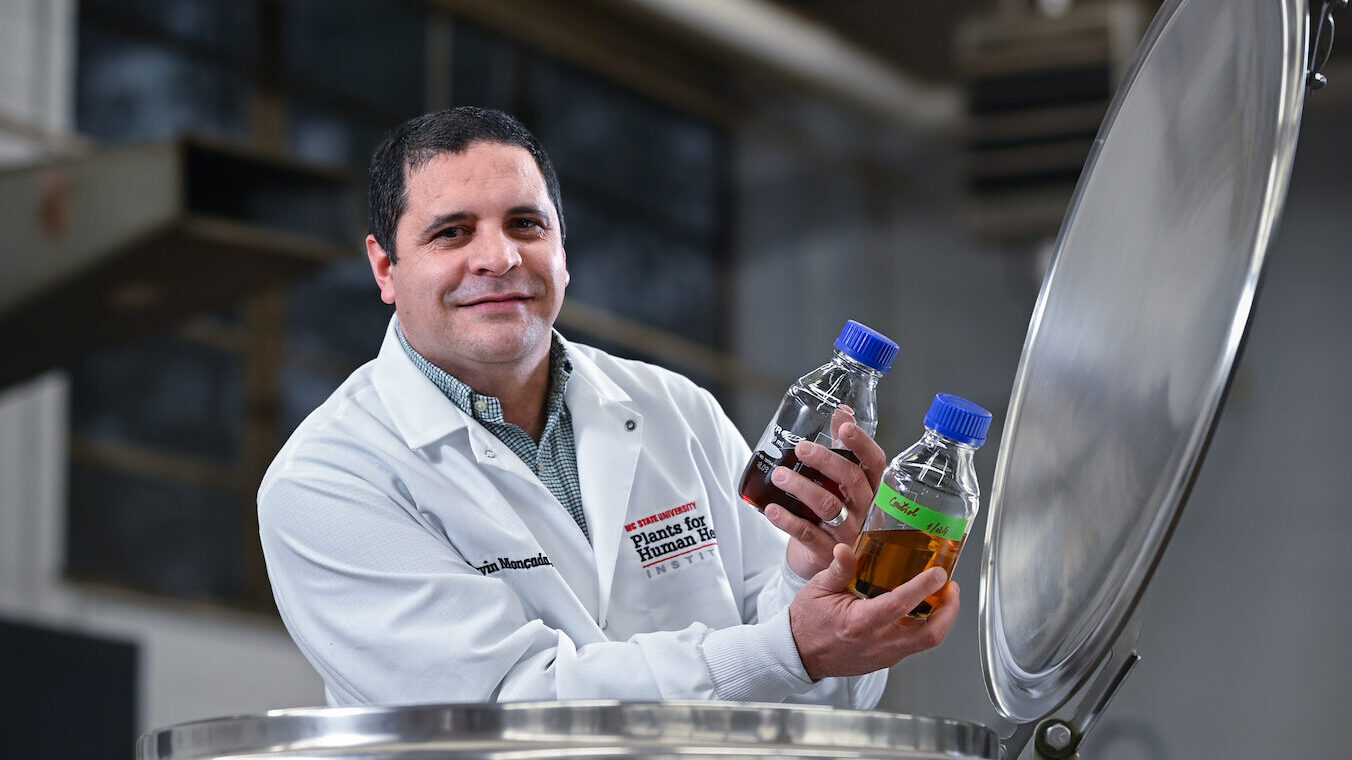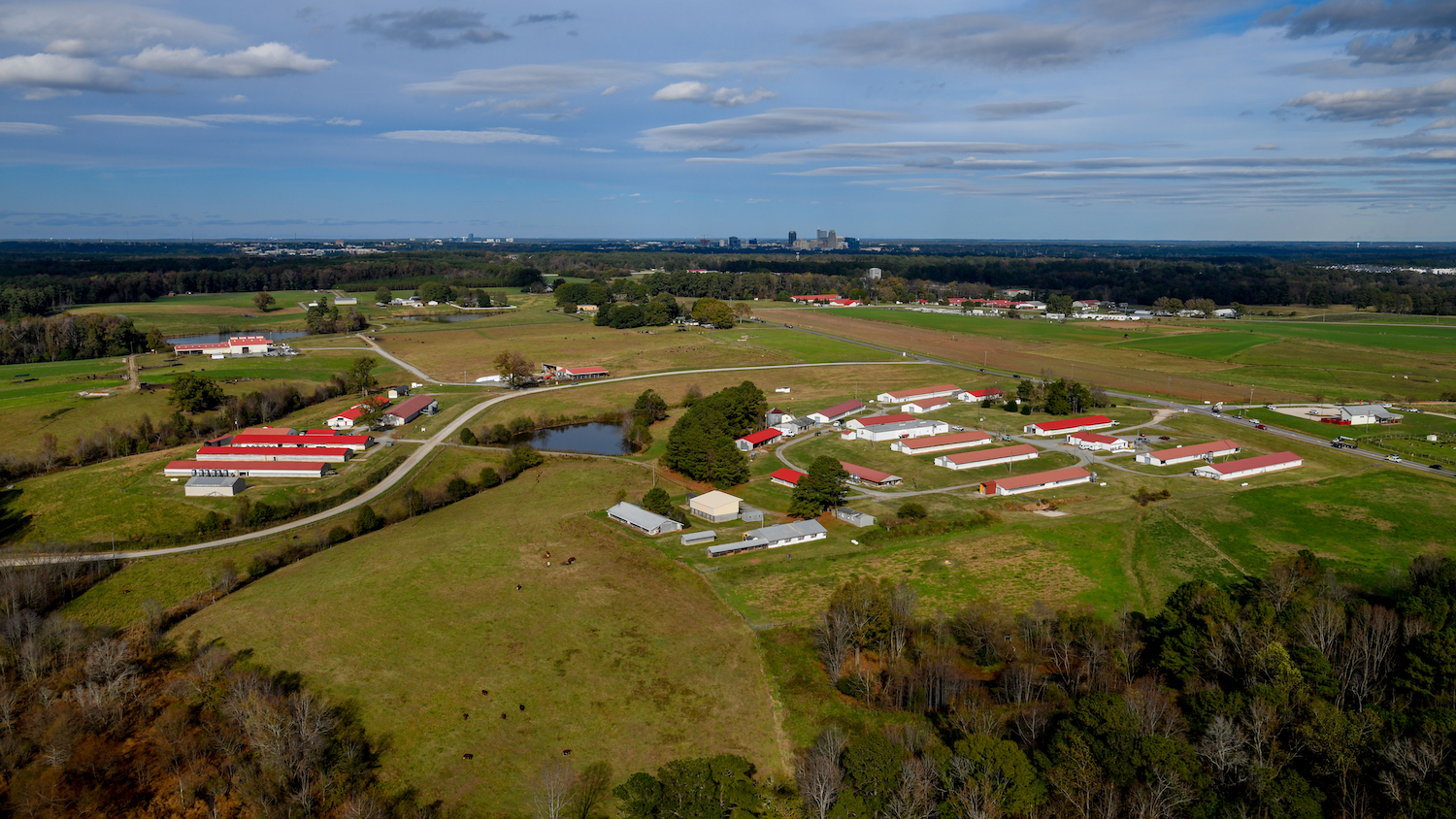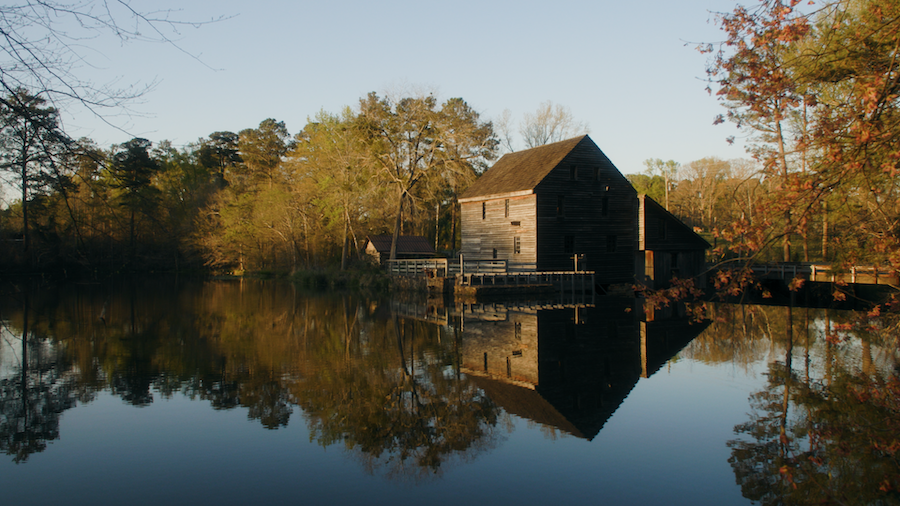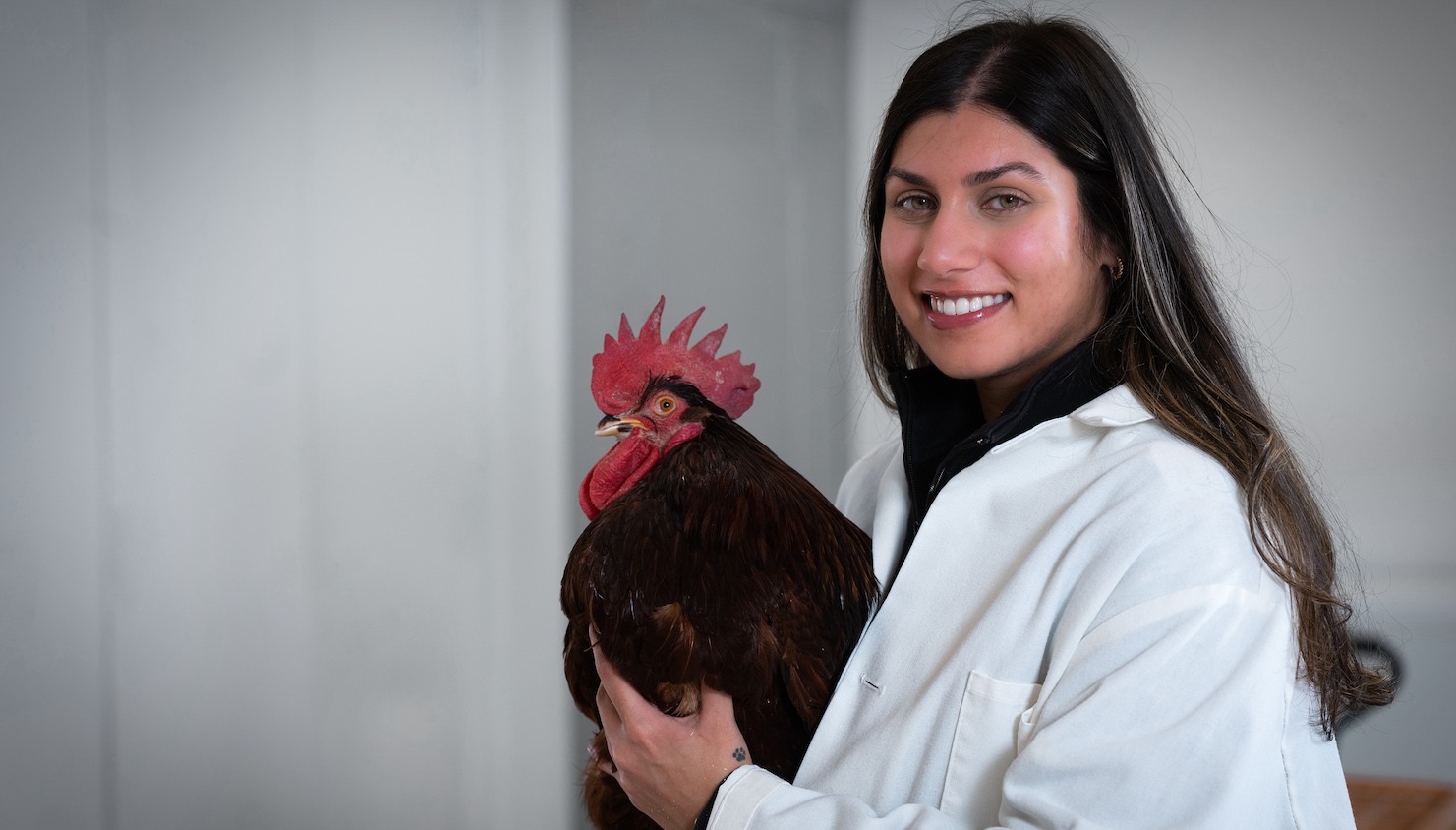The Changemakers
NC State’s Terri Long, Marvin Moncada and Kenny Sherin are creating life- and industry-altering change. Close the digital divide, shuck stereotypes for plant scientists and age liquor at a breakneck speed–all in a day’s work for these changemakers. Learn what’s next.
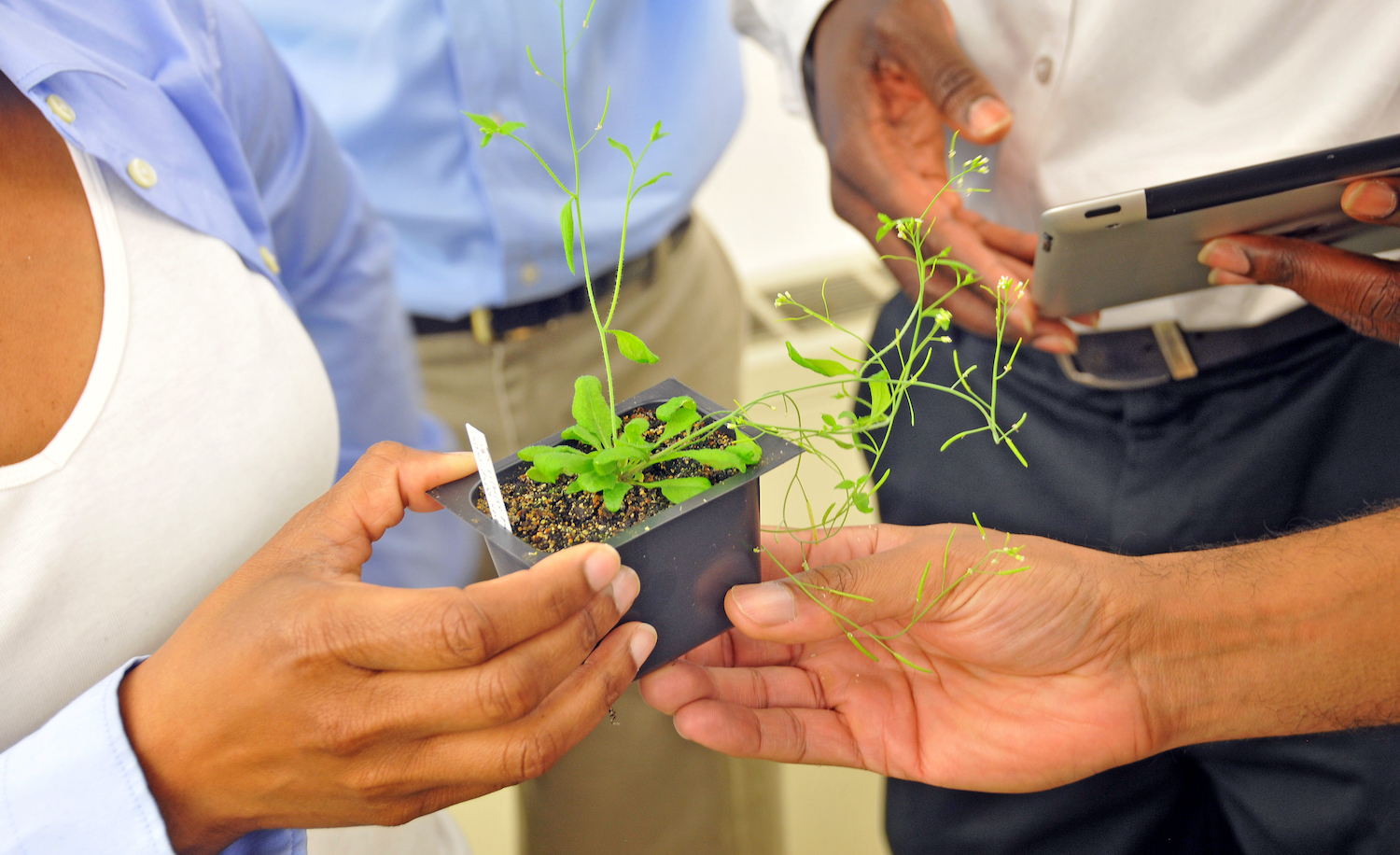
Discontent with the status quo, NC State University’s Terri Long, Marvin Moncada and Kenny Sherin are creating life- and industry-altering change.
As NC State Extension’s first broadband access coordinator, Sherin is finding resources to bridge the divide between the digital haves and have-nots.
As a gene-discovering life science expert, Long is inspiring students to break barriers and shatter stereotypes on their way to becoming plant scientists.
And as a food scientist who’s helped develop over 50 grocery store products, Moncada is out to transform a centuries-old beverage industry at a breakneck pace.
Closing the Digital Divide
By Simon Gonzalez
Kenny Sherin is a fixer. Not in the sense of making problems go away, but in the literal meaning of, well, fixing things. It comes from his background of growing up on a small family farm.
“I have a knack for seeing these random pieces of stuff laying around and knowing what to do with them,” he said. “On a farm, you’ll have an old carburetor or a broken piece of equipment. That’s your parts supply store. If something breaks, you go to the old piece of equipment and use it to make repairs. I grew up watching my dad fix anything that was broken just by the parts he had available.”
That background suits him well as NC State Extension’s broadband access and education coordinator. The digital landscape is strewn with opportunities and challenges. Matching issues with resources takes someone with an experienced eye and a penchant for problem-solving.
“My vision is to help North Carolina residents earn, learn and be well using digital resources,” he said. “The National Skills Coalition just released a study stating 92% of jobs now require some type of digital skill. Digital skills education is workforce development.”
Education encompasses lessons in productivity tools such as accounting software, spreadsheets, online banking, photo editing, email marketing, website building and even advanced skills like coding and cybersecurity. It also includes exciting technology such as monitoring moisture meters in grain storage facilities and using data from drones to track the health of crops.
Sherin, Randolph County’s Extension director, added broadband education to his duties in March 2021, about a year into COVID-imposed lockdowns. That’s not a coincidence. The pandemic forced many workers and students into a virtual world—and spotlighted how many areas of North Carolina lack access to broadband.
“My vision is to help North Carolina residents earn, learn and be well using digital resources.”
Expanding access to high speed internet is primarily the purview of the North Carolina Division of Broadband and Digital Equity. But while NC State, as Sherin puts it, “is not able to dig the ditches and put the cable in the ground,” it has a significant role.
“We are an educational institution,” he said. “We can help folks learn to use the technology available to them.”
With offices in all 100 counties of the state plus the Eastern Band of the Cherokee Indians, Extension is well positioned to help people navigate the challenges of access and education. NC State recently received a $1.33 million grant from the NC Department of Information Technology that will provide resources to teach digital skills at a county level.
“It’s right in the wheelhouse of Cooperative Extension to be doing this,” Sherin said. “Extension has always been there to help society adjust to new changes. It’s part of our DNA. Just as Extension helped farms modernize at the turn of the century, here we are again facing a new technological shift.”
Opening the Door for Diversity in Plant Sciences
By Emma Macek
Terri Long rarely turns down the opportunity to help.
“If I’m asked to participate, and I feel like I’m going to help someone, I’ll give it a shot,” says Long, a professor in North Carolina State University’s Department of Plant and Microbial Biology. “I want to help people in any way I’m called to do so.”
Long has dedicated her career to creating opportunities for students, and a new appointment as North Carolina Plant Sciences Initiative’s (N.C. PSI) platform director for education and workforce development widens the spectrum of students she’s able to reach.
“I think of this platform as an opportunity to build pathways to plant sciences for students who may not have considered studying plants and agriculture as a career option,” says Long.
Long grew up on a farm in Louisburg, North Carolina, where she developed an interest in plant sciences. But it was always difficult to envision herself, a Black woman, as a scientist.
We have some big problems to solve, like global warming, pests, drought and an increasing global population. We really need bright people with diverse opinions and tools to address these problems.
“I didn’t have mentors who looked like me when I was an undergrad,” says Long. “I had one Black female teaching assistant and one Black male faculty member. He was one of my favorite professors because he looked like me. That inspired me.”
Now, Long gets to return the favor as a mentor, touching lives from kindergarten to postdoctoral research, with the goal of giving students the opportunity to see people who look like them in positions they’d like to one day have.
“It’s not just students from minoritized groups,” says Long. “It’s any student who’s interested in plants and who wants to learn more and work towards a successful and impactful career.”
For K-12 outreach, Long provides students with the chance to tour the NC State University Plant Sciences Building (PSB) to meet scientists and participate in hands-on activities in the Demo Lab. She has also worked with Catalyst, a high school program designed to create STEM opportunities for students with disabilities, provide lab experiences and offer other K-12 outreach programs.
For undergraduate and graduate students at NC State and beyond, she has promoted internship and networking opportunities, helped coordinate funds for minority students to travel to national and international scientific conferences, and created opportunities to visit local N.C. PSI industry partners.
Long’s work also expands beyond the university. She’s helping to develop a 4-H curriculum on plant sciences, working with the Math and Science Engineering Network to create lab experiences at NC State for rural students, and collaborating with several groups to host the Inaugural Plant Sciences Day for high school students at the PSB. She’s also planning activities at the building for students attending the state FFA convention in June.
“I enjoy working with others to expose a young person to an opportunity that they never would’ve thought of,” says Long. “Now that you’ve opened up a door for them, they could potentially walk through it and create a whole new career pathway for themselves. Thirty years from now, that person could be a Nobel Prize winner.”
While building up the next generation of scientists, Long is committed to increasing diversity in the scientific community as a member of several diversity and inclusion committees. For her, diverse thinking is essential for advancing plant science: “We can’t come up with new ideas if everyone thinks the same.”
Long adds, “Diversity is important because we have some big problems to solve, like global warming, pests, drought and an increasing global population. We need bright people with diverse opinions and tools to address these problems.”
In the future, Long hopes to help underrepresented students develop laboratory technical skills so they have more competitive applications for graduate school and to increase her involvement with workforce development organizations across the state.
“I want to be impactful. I think that’s what we all want,” says Long. “We want to impact other people in a positive way. Also, I love plants. I’ve been fascinated with plants since I was young, and I want more people to realize how fascinating and important plants are.”
Speeding up the Aging Process for Spirits
By Alice Manning Touchette
When an aged whiskey or rum hits your palate, you are tasting a years-long process. After fermenting and distilling, the astringent, clear liquor is stored in a wood barrel where it develops its amber-to-dark brown color and flavors of vanilla, pepper, nuts and even caramel and mint from the wood tannins. The tannins are also to thank for mellowing the harsh flavors of alcohol. High-end rum and whiskey may sit in barrels for years, sometimes decades.
Many in the industry believe the aging process that gives distilled liquors their je ne sais quoi is intangible and mysterious. But Assistant Professor Marvin Moncada says he can develop flavor, color and smooth-tasting rum and whiskey in a fraction of the time.
“We are aging rum in 21 days, and it is the equivalent of a 5-year-old rum in flavor and alcohol level,” says Moncada. “And it tastes amazing.”
Moncada—a native of Honduras—came to NC State’s Department of Food, Bioprocessing and Nutrition Sciences with a research focus on creating functional ingredients and food products by upcycling wasted raw materials and byproducts. This includes but is not limited to plant-based protein concentrate production, rare sugar recovery, lipid recovery and bioactive extraction. He first became interested in rum distilling on a project at his previous position at Louisiana State University.
“While in Louisiana, I helped a distiller with some analysis on their rum, and I realized that in order to have a good rum to go on the market, they had to wait five to seven years to complete the aging,” Moncada explains. “As an innovator, I started thinking how can I make the process quicker? It’s an opportunity to help the industry. I started analyzing what happens in the barrel over time—the tannins of the wood that are getting in the rum, the astringent alcohol that’s going back into the wood—and how I could manipulate those conditions.”
“We are aging rum in 21 days, and it is the equivalent of a 5-year-old rum in flavor and alcohol level. And it tastes amazing.”
In his lab at the Plants for Human Health Institute, Moncada started testing half-liter samples with a water-bath method using a low temperature to retain volatile compounds that are sensitive to heat. He also played with natural light, LED light and a blend of wood to speed the aging process and develop flavor.
“In 21 days, we found very significant color change and taste,” says Moncada. “In collaboration with Dr. Slavko Komarnytsky’s lab, we identified the gas chromatography compounds, so we know how the chemistry changed.”
Now Moncada is working on scaling-up the process. He designed a 20-gallon rapid distiller and is consulting with the NC State College of Engineering to build it. He hopes to run larger experiments and further test the patent-pending process.
“The cost of aging spirits is significant, and handling large volumes creates strategic problems as the demand for spirits increases,” Moncada explains. “The accelerated aging methodology is a sustainable process that involves the use of naturally occurring, energy-efficient, environmentally friendly processes and avoids the use of chemical reagents.”
By eliminating the need for barrel aging, his invention will also save distillers money and time.
“This groundbreaking clean-label technology will allow the distillery industry to have a more sustainable, cost-effective production and an aged product in less than a month,” he says. “Small distillers new to the industry may be able to adopt it and have a quality product that is cheaper to produce, and people will enjoy it because it is very smooth.”
- Categories:
